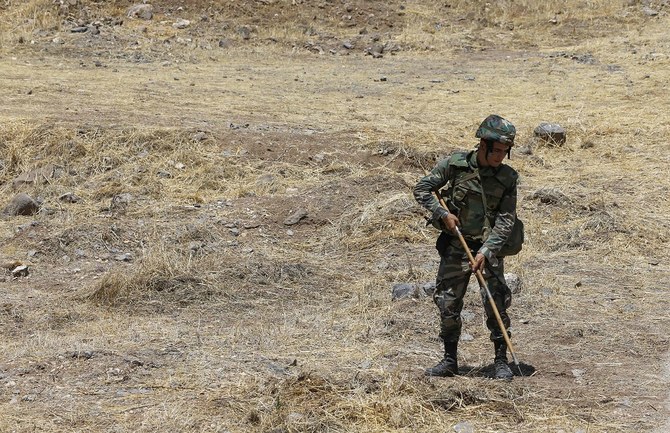DAMASCUS: After the fighting, Syrian farmer Abu Thaer returned to his farm to work. But he stepped on a land mine left behind by militants, changing his life for good.
At a medical charity in Damascus, the 46-year-old from the southern province of Daraa lifts up his black track pants to reveal a prosthetic leg.
“I was clearing out dead weeds and starting to plow when a land mine exploded,” said the farmer, sitting upright on his bed.
“My life was turned upside down,” said the agricultural worker, who asked for a pseudonym for fear of reprisal, his tanned face wrinkled beyond his years.
Abu Thaer is one of thousands of civilians wounded by explosives left behind in fields, by roads or even in buildings by all sides in Syria’s eight-year war.
Hundreds more have been killed by the explosives, the Britain-based Syrian Observatory for Human Rights says.
In July alone, 15 children were among 30 civilians killed by land mines, explosives or grenades in various parts of the country, it says.
This year, truffle digging saw many people, including women and children, lose their lives in the country’s center, northeast and east, state media has said.
Abu Thaer used to plant wheat and tomatoes in his village in the west of Daraa, before the area was overrun by jihadists affiliated to the Islamic State (IS) group.
Regime forces expelled the extremists from the area last summer after weeks of battle, but Abu Thaer says losing his leg has left him severely debilitated.
“I used to plow and cultivate the land, but now I’m no longer strong enough,” Abu Thaer.
“I only do simple tasks.”
Across Syria, more than 10 million people live in areas contaminated by explosive hazards, the United Nations says.
In areas it has retaken from rebels and jihadists with Russian backing since 2015, Syria’s regime is working to clear explosives.
On a near daily basis, the defense ministry announces the detonation of large quantities of explosives left behind by anti-regime forces in areas recaptured by the government.
In the Eastern Ghouta region just outside Damascus, soldiers have been sweeping a hamlet and surrounding fields for hidden explosives, more than a year after rebels were ousted.
After uncovering them with metal detectors and long sticks, they moved mortars, ammunition stockpiles and rusty land mines into a deep pit.
A loud bang resonated and a thick cloud of black smoke rose overhead, after they detonated the stockpile remotely using a long blue fuse, according to an AFP team present at the site.
“It’s a big challenge,” said a commander with the Syrian army’s engineering corps overseeing the mine clearing in Al-Muleha district.
The official, who also asked not to be named, said demining was especially difficult as “there are no maps of the land mines.”
As a result, sweeping operations could take “decades,” he added.
He accused rebels of having planted land mines in residential buildings, agricultural fields and state institutions before withdrawing.
“This has led to heavy losses,” the commander told AFP, warning they pose a long-term threat.
Mayas Mahmud Issa, an army general who presides over clearing operations in Eastern Ghouta, said his teams have swept 21 towns and villages since the April 2018 recapture of the ex-rebel bastion.
“We have detonated 140 tons of ammunition and explosives of different shapes, sizes and weights, both made locally and abroad,” he told AFP.
But authorities still have a long way to go to mitigate the threat.
In July 2018, the United Nations Mine Action Service (UNMAS) signed a memorandum of understanding with the government to establish a permanent representation in Damascus.
The United Nations has trained 70 people and deployed them to areas in Damascus and Hama to raise awareness about explosive hazards, UN spokeswoman Fadwa Abedrabou Baroud said.
It is also planning similar awareness campaigns for Syria’s southern provinces, including Daraa, Baroud added.
In recent weeks, Syrians have been receiving text messages on their phones warning them of the dangers of unexploded ordnance.
“Explosive remnants are dangerous. Do not touch... Immediately alert the nearest authority,” reads one such message.
But for Abu Thaer, the land mine threat is still a real one.
One year after his leg was amputated, he says he fears more mine explosions.

















